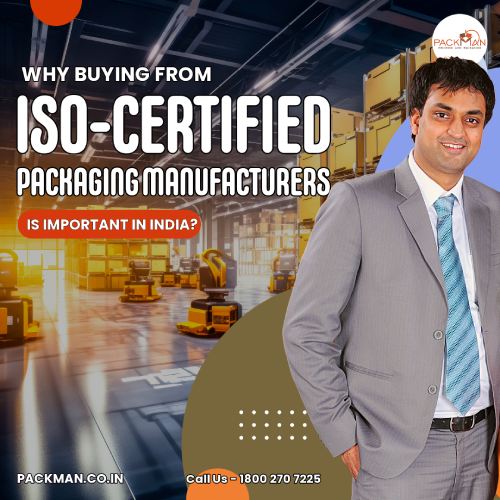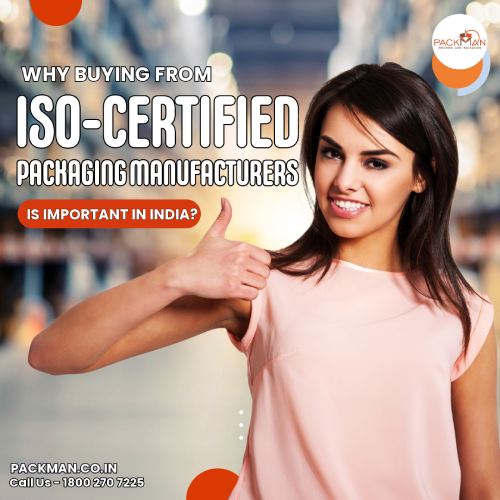In a bustling market, where choices are abundant, the first thing that captures a consumer’s attention is the packaging of a product. The colours, design, and overall appearance play a vital role in influencing purchasing decisions. Whether it’s the bright colours, sleek design, or informative labels, packaging plays a crucial role in attracting consumers.
However, what lies beneath the surface of that eye-catching packaging is equally important, especially in the world of manufacturing and production. This is where ISO certification (International Organization for Standardization) comes into play, ensuring that the packaging industry adheres to international standards for quality, safety, and sustainability.
Why Buying From an ISO-certified Packaging Manufacturer is Important?
Packman Packaging, the leading manufacturer and wholesaler of corrugated boxes in India explains the importance of ISO certification in the packaging industry in this article:
1. Consistency and Efficiency
ISO standards emphasize the importance of efficiency and consistency in operations, especially within the packaging industry, where adhering to established procedures is critical to avoid product defects and delays. Companies with ISO certification are better positioned to streamline their processes, minimize production errors, and meet deadlines for packaging material delivery. ISO certification enhances control over business processes, leading to heightened consistency. This consistency ensures that customers consistently receive high-quality service and products whenever they engage with the company.
2. International Credibility
An ISO certification is vital for businesses seeking credibility abroad. It grants global recognition and elevates brand reputation, setting you apart from competitors. For packaging companies, ISO certification signifies a dedication to quality, earning trust from both industry peers and consumers. The certification boosts product trust and enhances access to international markets, broadening business prospects, especially for packaging companies in India.
3. Quality Assurance
ISO Certification reassures consumers that products meet international standards, reducing the risk of rejected orders due to defects. ISO 9001-certified suppliers maintain strict quality control standards. They have documented processes and a Quality Manual outlining how they meet these standards. These guidelines leave little room for deviation, ensuring consistent product quality. Regular audits hold suppliers accountable for compliance. This guarantees high-quality, dependable packaging, not limited to one location but upheld globally.
4. Government Label
An ISO certificate simplifies marketing high-quality products. It allows you to display an ISO label on your product and in documentation, which communicates quality. ISO certification is increasingly essential due to government regulations. Some countries, like India, stress the importance of meeting global standards. In certain instances, ISO certification is mandatory to access markets or government contracts. Consequently, obtaining this certification becomes a strategic choice for businesses.
5. Focus on Sustainability
ISO 14001 is an environmental management standard beneficial for packaging companies aiming to minimize their environmental footprint. Certified firms often opt for sustainable materials, cut waste, and embrace eco-friendly practices. This not only helps the planet but also attracts environmentally conscious consumers. ISO 14001 signifies a company’s dedication to environmental responsibility. It’s a critical aspect for packaging companies, and certification encourages green initiatives. This involves waste reduction, efficient processes, minimal material usage in packaging, and utilizing recycled or recyclable components when feasible.
6. Compliance with Regulations
Packaging is subject to various regulations and safety standards in different countries. ISO certification helps packaging companies navigate these complex regulatory landscapes. It ensures that products meet not only local but also international requirements, making them more competitive in the global market.
7. Customer Satisfaction
ISO certification signals a packaging company’s commitment to customer satisfaction. It ensures consistent product quality, making customers familiar with what to expect. This fosters satisfaction and loyalty. Working with ISO 9001-certified suppliers builds strong customer-oriented relationships, resulting in high-quality packaging designs. Non-certified suppliers may jeopardize product quality, harming your brand if customers receive subpar packaging.
ISO certification in the packaging industry is a vital tool for ensuring quality, consistency, sustainability, and global competitiveness. It fosters trust, compliance with standards, and ultimately, customer satisfaction. Packaging companies embracing ISO standards pave the way for enhanced operational efficiency and enduring consumer confidence.
About Packman Packaging
Packman Packaging is currently the topmost manufacturer and supplier of custom-printed corrugated Boxes, tamper-proof courier bags, and packaging tapes, in India. The company manufactures and ships over 1 lakh corrugated boxes every day from its ISO 9002-certified manufacturing units located in Delhi NCR. Packman also delivers them to over 400 cities across India within 9 working days.





